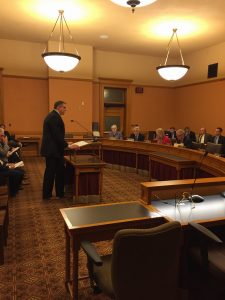
The Kansas Senate beat back their leader’s effort to cut the spending, including spending for public schools, on their way to passing legislation to pay the state’s bills through June 30. The spending package which passed the Senate resembles the bill the House passed in mid-February. They both find the roughly $280 million needed to close the budget by delaying payments to KPERS and borrowing against the state’s unused funds. Senate President Susan Wagle attempted to introduce a two percent across the board budget cut into the bill but only six of her colleagues supported that. Now the House and Senate will conference and send a final spending bill to the Governor, presumably this week. That’s just the first part of the puzzle.
New Tax Proposals
Now that a way has been found to pay the bills for this Fiscal Year, lawmakers will turn their sites again to the task of reforming the tax code, state spending or a combination of both to develop budgets for the next two years. The legislature already tried to build a tax package but the Governor rejected it. So they are back to the drawing board considering proposals ranging from a 3.9% flat tax, which every Kansan would pay regardless of their income level, to raising the gas tax as much as $.11 to imposing sales tax on car towing, security guards, barbershops, beauty salons and dating services, among sundry other types of businesses. (Not necessarily sundry businesses, mind you.)
Their task is certainly not made any easier by the supreme court’s school finance ruling. Committees in the House and Senate are developing a new school finance formula they hope will address the court’s ruling that some Kansas pupils are not receiving an adequate education without breaking the bank.
Entertainment Districts
A House committee has advanced legislation which would give cities, like Topeka, the ability to designate certain areas within which adults could carry wine and beer down the sidewalk. Current law requires licensed bars and restaurants to stop any patron from carrying their Pinot Grigio out the door. Any reader of this update with a penchant for beverages stronger than Pepsi will presumably have encountered this somewhat archaic-feeling legality. The new legislation would permit the creation of “common consumption areas.” As long as the adult drink was purchased from a licensed vendor and sold in a marked cup, patrons would now be able to stroll from their favorite restaurant or microbrewery to their favorite art gallery without being forced to dump their favorite lager on the way out. The bill advances to the floor of the House. There is still a lot of work to be done but this is good progress on a law which would clear the way for Topeka, and other Kansas cities, to choose for themselves whether and where to develop socially dynamic entertainment districts.
HPIP & PEAK
 Two bills introduced in the Senate last week continue the ominous scrutiny being paid to two important tools for attracting employers to Kansas. The bills would place a 3-year moratorium on the jobs incentive programs called High-Performance Incentive Program (HPIP) and Promoting Employment Across Kansas (PEAK). Matt Pivarnik testified earlier in the month against two similar bills. He argued such incentive programs are exactly what the state should be encouraging at a time when Kansas is seeking to diversify its jobs base. Pivarnik also noted that employers watch closely what goes on in the Statehouse and could well interpret legislation like this as a signal that Kansas is no longer serious about attracting business. The Chamber will join forces with the Coalition of Local Chambers, the state chamber of commerce and others to continue to voice its strong opposition to bills which diminish or eliminate these important tools of economic development.
Two bills introduced in the Senate last week continue the ominous scrutiny being paid to two important tools for attracting employers to Kansas. The bills would place a 3-year moratorium on the jobs incentive programs called High-Performance Incentive Program (HPIP) and Promoting Employment Across Kansas (PEAK). Matt Pivarnik testified earlier in the month against two similar bills. He argued such incentive programs are exactly what the state should be encouraging at a time when Kansas is seeking to diversify its jobs base. Pivarnik also noted that employers watch closely what goes on in the Statehouse and could well interpret legislation like this as a signal that Kansas is no longer serious about attracting business. The Chamber will join forces with the Coalition of Local Chambers, the state chamber of commerce and others to continue to voice its strong opposition to bills which diminish or eliminate these important tools of economic development.
